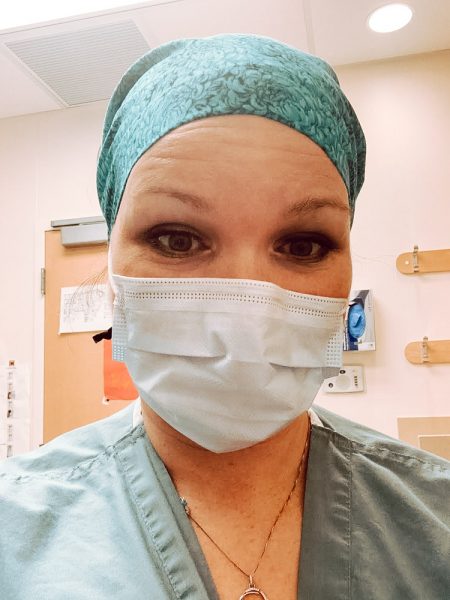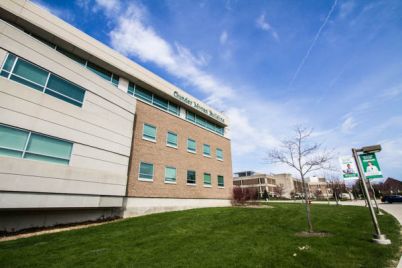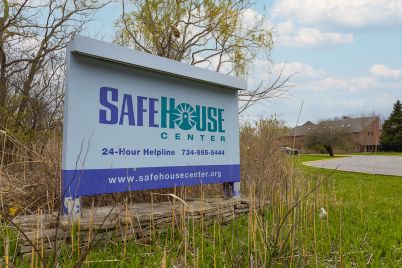WCC nursing instructor works in COVID-19 unit: ‘I just wish people took this more seriously’

Nurse Jamie Langlois takes a selfie wearing her face mask and scrubs. Langlois, also a nursing instructor at WCC, currently cares for patients in the COVID-19 unit at Michigan Medicine. Photo by Jamie Langlois
By Lilly Kujawski
Editor
We hear the numbers, but most of us don’t see the reality of what’s going on inside the hospitals. For Jamie Langlois, a nurse at the University of Michigan’s health system Michigan Medicine, the scale of the COVID-19 pandemic is unlike anything she’s seen before.
“This scale is like… constant. It’s relentless. It’s unfathomable, really,” Langlois said. She normally works in the pediatric intensive care unit, but volunteered to care for patients in the adult COVID ICU. “It’s an incredibly intense environment; everybody’s very, very sick.”
As of May 2, there are 43,207 confirmed cases of coronavirus in Michigan and 4,020 deaths.
“It does take so much to care for people that are that critically ill, so when there’s thousands of them at a time, it’s unmanageable,” Langlois said. “Of all the numbers, the majority of them are moderately, you know, not very sick, which is great. But the amount of resources, and skill, and mental, emotional and physical care that goes into trying to get these patients better is like… extraordinary.”
Packed hospitals
Typically, critically ill patients have their own ICU room, but in the COVID unit, there’s now usually two patients per room, Langlois said.
As of May 1, there are 95 COVID-positive patients hospitalized at Michigan Medicine, according to its website. To date, the hospital has discharged 396 COVID-19 patients. In two different instances, the Ann Arbor hospital had as many as 229 COVID-19 patients at one time.
“The patient ratios are amazing… normally, so we’re used to caring for like one or two critically ill patients, and in this environment, we’re caring for two or three and they’re not super stable patients, so that’s challenging too,” Langlois said.
Right now, Michigan Medicine has the personal protection equipment, or PPE, it needs, said Jordyn Imhoff, a spokeswoman for Michigan Medicine.
“We currently have enough PPE to keep our employees safe as they care for patients,” Imhoff said.
Langlois said she still worries about the possibility of running out in the future. Currently, staff is reusing the N95 mask, the respiratory protective device that offers the most protection, Langlois said.
“There’s that underlying fear… ‘is that truly safe?’” she said.
Caring at a distance
It’s hard to give patients the kind of care she normally would, Langlois said.
“It’s very hard as a nurse to try to comfort somebody when you’re wearing a shield and a mask,” she said. “It alters the whole human response.”
“I had a patient on a ventilator that was awake and afraid, and she reached her arms out to hug me,” Langlois said. “I backed away from the hug, and I grabbed her hand and told her not to be afraid and squeezed her hand and held her hand, but… normally, I would not think anything of hugging a patient. I would absolutely hug a patient.
“In my head I was like, ‘oh my god, I can’t even give this lady the comfort she deserves when she’s so scared,’” Langlois said.
Similarly, she said it’s hard because families can’t visit their loved ones. In certain end-of-life circumstances, loved ones may be able to come in to say goodbye, but if they can’t, they have to do it virtually, over FaceTime or other video chat apps.
Even when families can come to say goodbye in person, they must do so while wearing a bulk of protective gear. In these cases, loved ones can’t touch and get close to the patient like they normally would, and they can’t say goodbye the way they’d like to, Langlois said.
Langlois said she’s amazed by the way many of the grieving families turn around and offer support to the hospital staff, even as they experience such a difficult, personal loss.
“It’s also very strange to see patients’ families go through that, and while they’re going through that, they express sympathy to the staff, to the doctors and nurses, because they see what’s happening,” she said.
Support and solidarity
As they navigate circumstances riddled with fear and uncertainty, Langlois said she and her colleagues still hold onto hope for each patient they care for.
“We have hope for all of them; we have hope that every single one of them will walk out the door,” she said. “Celebrating the patients who do go out to the floor, and do end up going home—that gives us hope, also.”
The way the hospital staff works together to save as many people as possible is inspiring, Langlois said.
“We know that a lot of them won’t get better,” she said. “But to see everybody put such an effort into trying… it’s pretty incredible.”
Many of the nurses, doctors and environmental-service workers assigned to the COVID unit came from different areas of the hospital and didn’t know each other very well before, but working together in the face of the pandemic united them.
“Many of us are strangers, but it doesn’t feel that way because we’re all experiencing the same level of intensity at the same time,” Langlois said.
She said this experience wears hard on the staff emotionally. Some have trouble sleeping at night. Many don’t feel comfortable talking to their families about their work, wishing to spare them from the harsh details, so instead they talk to each other.
“I have no doubt that most of us will be permanently affected,” Langlois said.
Staff members lean on each other, share support, and rely on one another as sources of hope, she said. And that support extends from staff beyond the COVID unit.
“Nurses on other units will see when we push number 12 on the elevator and they’re riding the elevator with us. They just always say something like, ‘you can do it,’ and ‘we’re thinking of you and supporting you,’” Langlois said.
Nurses from other departments often leave drawings and post-it notes of kindness and encouragement on locker room doors for the nurses working in the COVID unit, she said.
With such a high degree of regular exposure, many COVID ICU workers choose not to go home out of fear of infecting their families, Langlois said. She said some nurses are staying in hotels at this time.
Langlois said that some of her colleagues are sick with the coronavirus and are current patients at the hospital.
Currently, there are two coronavirus-positive Michigan Medicine employees hospitalized in the COVID unit, Imhoff said.
When Langlois goes home from work, she worries about getting her two teenage children sick.
“I’m more afraid that I’ll get somebody else sick than I am of getting sick,” she said.
“As much as we want to be there doing what we’re doing, we share the feelings that everybody else has here… you know, we’re scared and we just want our normal lives back,” Langlois said.

A sign placed on the side of the road thanks healthcare workers. Lilly Kujawski | The Washtenaw Voice
Our job to flatten the curve
Langlois said she wishes more people were taking the situation seriously.
While an approximate 2% death rate may not seem so bad, it’s nothing to take lightly, Langlois said. She said it’s fortunate that most people who become sick experience only moderate or even mild symptoms, but the patients who do have severe symptoms often become extremely sick.
“People on Facebook say, ‘oh, it’s only a 2% death rate’ and ‘I should be able to go out and do whatever I want,’ and ‘what’s 2%?’” Langlois said. “That 2% is my 100%. And these families that are losing these people—their 100%.”
It’s a battle to save patients as sick as the ones she cares for. That 2% may not seem so significant for someone who hasn’t been impacted personally, Langlois said, but that situation could change.
“It very quickly could change,” Langlois said. “For somebody that’s saying, ‘oh it’s only 2%,’ it very quickly could be somebody in their family, and it would very quickly turn into their 100%.”
Gov. Gretchen Whitmer extended her stay-at-home executive order through May 15, which continues the closure of “non-essential” businesses and limits mobility to essential trips only, among other restrictions. The order has seen pushback from some Michigan residents over the past couple weeks, including protests at the state capitol and at Whitmer’s residence, as well as a recall threat.
Despite the call to reopen the economy from some, a recent survey conducted by the Morning Consult and POLITICO found that the majority of Americans support social distancing efforts. 73% of respondents said that social distancing measures should continue for as long as is necessary, even if it means further damage to the economy.
It’s our responsibility to stay home and do what we can to mitigate the spread, Langlois said.
“People need to be serious about staying home for a little while,” she said. “Look at it as time spent with people [you] love, and laugh, and have fun, and play cards, and enjoy it.”
A letter to nursing students
Besides her work as a nurse, Langlois is also a nursing instructor at WCC and Eastern Michigan University.
“My heart breaks for my students, too,” said Langlois, who’s taught at WCC for three years. “Some of them are scared to be nurses now.
“They’re in this too,” she added. “I’m worried about them.”
Langlois said she recently wrote a letter to her students to offer them some encouragement and perspective during the pandemic.
“Each semester I usually give my senior students ‘a talk’ about the first six months of nursing,” Langlois wrote in her letter, which she shared with the Voice. “This talk is meant to encourage and inspire but also reassure you that the beginning may not be what you expected; but it gets better. This talk may be needed now more than ever but it’s going to look quite different.
“The uncertainty, the fear, the anxiety: I share these feelings with you,” she said in the letter. “The beginning of your careers was supposed to be exciting and fun. The last semester of school was supposed to be worrying about exams and what to wear to graduation. It all looks different now and it’s OK to worry about that. It’s OK to worry about your family and your safety. It’s OK to think to yourself, ‘what did I sign up for?’”
Langlois reminded her students that as nurses, they are needed now more than ever.
“You are going to be the most incredible nurses; I have no doubt,” she wrote. “You are going to help the most vulnerable people through the worst and most impossible experiences in their lives.”
As scary as this job might seem right now, Langlois told her students they should still be excited about nursing.
“I just reminded them of the privilege it is to be with people in the most profoundly worst moments in their life,” Langlois said to the Voice. “There are also good days… I told them to remember that, too. There’s nothing like being the nurse that helps somebody have a good day.”
This story has been updated to reflect the total number of confirmed coronavirus cases and deaths reported in Michigan on May 2.


